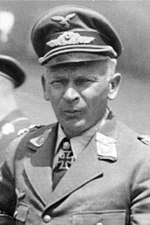Wolfram Freiherr von Richthofen, Date of Birth, Place of Birth, Date of Death
TweetWolfram Freiherr von Richthofen
German military officer and aviatorAbout Wolfram Freiherr von Richthofen
- Wolfram "Ulf" Karl Ludwig Moritz Hermann Freiherr von Richthofen (10 October 1895 – 12 July 1945) was a German fighter pilot during World War I and rose to the rank of field marshal in the Luftwaffe (Nazi German Air Force) during World War II.
- Born in 1895 into a family of the Prussian nobility, Richthofen grew up in prosperous surroundings.
- At the age of eighteen, after leaving school, he opted to join the German Army rather than choose an academic career, and joined the army's cavalry arm in 1913.
- On the outbreak of the First World War, Richthofen fought on the Western Front, winning the Iron Cross Second Class.
- In 1915 he was posted to the Eastern Front, where he stayed until 1917.
- The Richthofen family produced several notable personalities that would become famous during the First War.
- His cousins, the brothers Lothar and Manfred, both became flying aces and encouraged him to join the Luftstreitkräfte (German Imperial Air Service).
- He did so, and joined Manfred's Jagdgeschwader 1 (Fighter Wing 1).
- On Wolfram's first mission with his cousin, on 21 April 1918, Manfred was killed.
- Wolfram went on to claim eight aerial victories before the armistice in November 1918.
- Lothar survived the war but was killed in 1922. After the war Richthofen resumed civilian life after being discharged from the army.
- He studied engineering at a university before rejoining the Reichswehr, the German armed forces of the Weimar Republic era.
- In 1933 Hitler and the Nazi Party came to power in Germany, and the Reichswehr was transformed into the Wehrmacht.
- Richthofen joined the new Luftwaffe.
- He also served as part of the Condor Legion which supported the Nationalists in the Spanish Civil War.
- During this time, he recognised the need for close air support in military campaigns and championed the dive bomber.
- He also made innovations in ground-air communications. When the Second World War broke out in September 1939, Richthofen commanded a specialised ground-attack air unit, Fliegerkorps VIII (8th Air Corps), first as a small active service unit in the Polish Campaign, and then as a full-sized Air Corps in Western Europe, from May to June 1940.
- The effectiveness of his units proved decisive at certain points in the French Campaign, particularly covering the German thrust to the English Channel.
- He was awarded the Knight's Cross of the Iron Cross on 23 May 1940, in view of his achievements.
- He continued in frontline service during the Battle of Britain and the Balkans Campaign in 1940 and 1941.
- Richthofen achieved his greatest success on the Eastern Front.
- In particular, he achieved notable success in the Crimean Campaigns during 1942.
- Despite offering vital tactical and operational support to Army Group South, he was moved to the Mediterranean Theatre of Operations, where he commanded Luftwaffe forces in the Italian Campaign.
- He remained in active service until late 1944, when he was retired on medical grounds.
- Soon after the capitulation of Germany in May 1945, he was taken prisoner by the United States Army, but on 12 July he died in captivity of a brain tumour. Richthofen's reputation, according to his biographer, James Corum, was of a competent but ruthless practitioner of air power.
- Richthofen is not considered a war criminal for his command of air forces, but he knew of the German mistreatment of Soviet prisoners of war, and was marginally involved in disseminating orders pertaining to their treatment—though the Luftwaffe in general had only partial responsibility for them.
- Richthofen was a de facto war criminal, as virtually all other senior commanders on the Eastern Front were guilty of violating the Geneva Conventions in the handling of civilians and prisoners of war, whose abuse Richthofen condoned.
- Richthofen's death weeks after the war prevented his probable arrest and subsequent prosecution at the High Command trial.
Read more at Wikipedia
See Also
- Famous People's Birthdays on 10 October, Poland
- Famous People's Birthdays in October, Poland
- Famous People's Birthdays on 10 October, Germany
- Famous People's Birthdays in October, Germany
- Famous military officer's Birthdays on 10 October, Poland
- Famous military officer's Birthdays in October, Poland
- Famous aircraft pilot's Birthdays on 10 October, Poland
- Famous aircraft pilot's Birthdays in October, Poland
- Famous military officer's Birthdays on 10 October, Germany
- Famous military officer's Birthdays in October, Germany
- Famous aircraft pilot's Birthdays on 10 October, Germany
- Famous aircraft pilot's Birthdays in October, Germany


 Date of Birth:
Date of Birth:  Place of Birth: Silesia, Poland
Place of Birth: Silesia, Poland